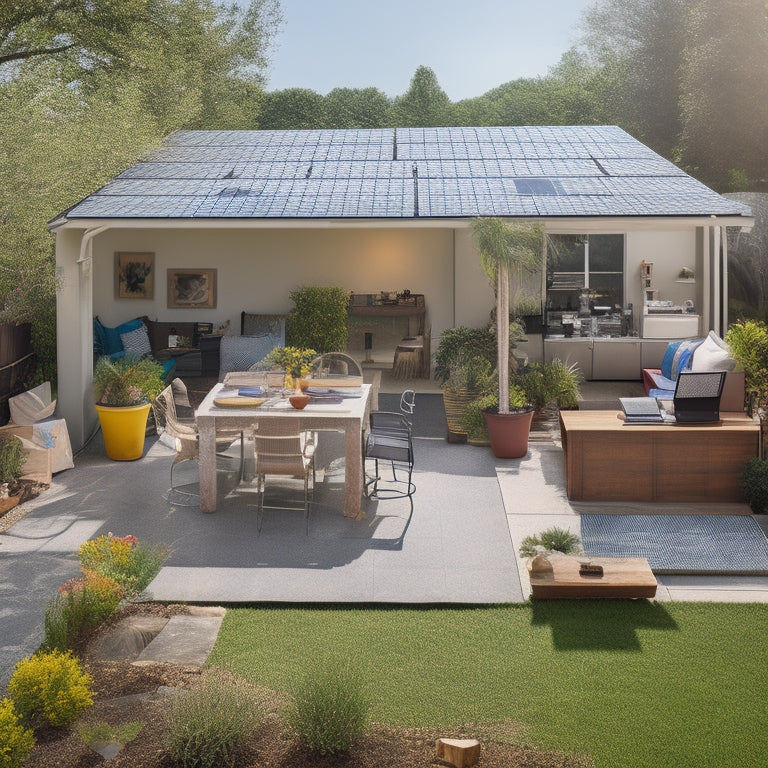
10 Essential Tips for Buying Solar Panels Online
Share
When purchasing solar panels online, you're investing in a long-term commitment to renewable energy and significant savings on your energy bills. To guarantee a smooth purchase, research and compare solar brands, checking reviews and ratings from multiple sources. Verify product certifications, warranties, and quality, and assess your energy requirements and roof size and condition. Evaluate panel efficiency, manufacturer's warranty terms, and compliance with local regulations. Calculate the total cost of ownership and ensure secure online payment options. By following these essential tips, you'll be well on your way to harnessing the power of solar energy - and there's more to explore ahead.
Key Takeaways
• Research and compare different solar brands, considering reviews, ratings, and certifications to ensure high-quality products and reliable customer support.
• Verify solar panels meet IEC certification standards, and look for warranties covering performance, product, and durability with reliable customer support.
• Assess energy requirements and roof conditions, including dimensions, shading, orientation, and obstacles to determine the ideal solar panel configuration.
• Ensure certifications from reputable organizations like UL or IEC, and verify compliance with local building codes, permits, and government incentives.
• Calculate the total cost of ownership, including installation, maintenance, and replacement expenses, and prioritize secure online payment options with SSL encryption.
Research and Compare Solar Brands
When shopping for solar panels online, researching and comparing different solar brands is crucial to guarantee you find the best fit for your energy needs. You want to invest in a reputable brand that offers high-quality products and reliable customer support.
Start by looking into a brand's reputation online, checking reviews and ratings from multiple sources. A well-established brand with a strong reputation is more likely to provide durable and efficient solar panels.
Additionally, stay up-to-date with industry trends to make sure you're getting the latest technology. Research the latest advancements in solar panel design, efficiency, and materials. This will help you make an informed decision when selecting a brand.
By considering brand reputation and industry trends, you'll be able to narrow down your options and find a solar panel system that meets your energy requirements.
Check Product Certifications and Warranties
When purchasing solar panels online, you'll want to make sure the products you're considering meet certain standards. You should look for certifications from reputable organizations, such as those that meet IEC certification standards, to guarantee the panels are reliable and efficient.
Additionally, you'll want to investigate the manufacturer's warranty coverage options and panel performance guarantees to protect your investment.
IEC Certification Standards
Prior to making a purchase, verify that the solar panels you're considering meet the International Electrotechnical Commission (IEC) certification standards, which guarantee the product's quality, safety, and performance. As a consumer, it's crucial to confirm that your solar panels comply with these rigorous standards, especially when investing in renewable energy solutions. IEC certification is a hallmark of excellence in the industry, and it's a confirmation of the manufacturer's commitment to quality and safety.
When purchasing solar panels online, look for the IEC mark or certification number on the product description or manufacturer's website. This certification ensures that the solar panels have undergone rigorous testing and meet the required standards for performance, safety, and environmental sustainability.
As the world shifts towards renewable energy, international cooperation and standards like IEC certification play a crucial role in promoting a unified approach to quality and safety. By choosing IEC-certified solar panels, you're not only guaranteeing a high-quality product but also contributing to a global effort to promote sustainable energy solutions.
Panel Performance Guarantees
You should always verify the panel performance guarantees offered by the manufacturer, which typically include product certifications and warranties that guarantee the solar panels will meet their advertised efficiency and power output. This confirms that you get the performance you paid for and holds the manufacturer accountable for their product's quality.
| Certification/Warranty | Description |
|---|---|
| IEC 61215 | International standard for crystalline silicon terrestrial photovoltaic (PV) modules |
| IEC 61730 | International standard for PV module safety qualification |
| 25-Year Performance Warranty | Guarantees a minimum power output over 25 years |
| 10-Year Product Warranty | Covers defects in materials and workmanship |
| UL Certification | Compliance with US safety standards for PV modules |
Warranty Coverage Options
What specific warranty coverage options are included in the manufacturer's warranty, and how do they impact the overall value of your solar panel investment?
As you shop for solar panels online, it's important to scrutinize the warranty terms. Typically, manufacturers offer a standard warranty that covers defects in materials and workmanship for a specified period, usually 10 to 25 years.
However, you should also examine the warranty exclusions, which outline specific scenarios where the warranty is void. For instance, some manufacturers may exclude coverage for damage caused by extreme weather conditions or improper installation.
When evaluating warranty coverage options, consider whether the manufacturer offers extended warranties, which can provide additional protection beyond the standard warranty period. These extended warranties often come at an additional cost but can provide peace of mind and protect your investment in the long run.
Be sure to carefully review the terms and conditions of the extended warranty to understand what's covered and what's not. By carefully examining the warranty coverage options, you can make an informed decision that ensures your solar panel investment is protected for years to come.
Understand Your Energy Requirements
To accurately size your solar panel system, determine your average daily energy consumption in watt-hours (Wh) by reviewing your past utility bills and identifying the highest energy usage periods. This will help you understand how much energy you need to generate from your solar panels.
You can also conduct an energy audit to identify areas of energy inefficiency in your home. This will help you optimize your energy usage and reduce your reliance on the grid.
Take stock of your home appliances, including refrigerators, air conditioners, and lighting, to determine their energy consumption. You may be surprised at how much energy they use.
By understanding your energy requirements, you can choose the right solar panel system that meets your needs. This will guarantee that you generate enough power to support your energy usage.
With the right system in place, you can enjoy significant savings on your energy bills and reduce your carbon footprint.
Assess Roof Size and Condition
Your roof's size and condition play a vital role in determining the suitability of your home for a solar panel installation. Before buying solar panels online, it's important to assess your roof's size and condition to guarantee a successful installation.
Measure your roof's dimensions to determine the available space for solar panels. A larger roof doesn't always mean more solar panels, as obstacles like skylights, vents, and chimneys can reduce the usable area.
Conduct a shading analysis to identify areas that receive partial or full shade, which can impact solar panel performance. Consider the orientation and angle of your roof, as well as surrounding trees, buildings, or structures that may cast shade.
Roof obstacles like these can affect the efficiency of your solar panel system, so it's vital to factor them into your assessment. By evaluating your roof's size and condition, you'll be able to determine the ideal solar panel configuration for your home and ensure a successful installation.
Evaluate Panel Efficiency and Quality
When shopping for solar panels online, you'll encounter a wide range of products with varying levels of efficiency and quality, making it important to evaluate these factors carefully to make sure you get the best value for your money.
To make certain you're getting high-quality solar panels, look for products with high efficiency ratings, typically above 20%. This will guarantee you're getting the most energy conversion from your panels. Additionally, ponder the panel's durability, as this will impact its lifespan and overall performance.
Here are some key factors to contemplate when evaluating panel efficiency and quality:
-
Panel Efficiency: Look for products with high efficiency ratings (>20%) to maximize energy conversion.
-
Panel Durability: Evaluate the panel's build quality, materials, and warranty to confirm it can withstand environmental factors.
-
Energy Conversion: Consider the panel's ability to convert sunlight into usable energy.
- Certifications: Check for certifications from reputable organizations, such as UL or IEC, to verify the panel meets industry standards.
Look for Online Reviews and Ratings
When buying solar panels online, you'll want to gauge the seller's reputation by checking online testimonials and verifying their ratings.
You can do this by reading reviews on the seller's website, as well as on independent review platforms.
Check Online Testimonials
Reading reviews from multiple online sources, such as Yelp, Trustpilot, or Google Reviews, can give you a well-rounded understanding of a solar panel brand's reputation. When buying solar panels online, it's important to check online testimonials to get a sense of the brand's customer satisfaction levels. This social proof can help you make an informed decision.
Here are some key things to look for when checking online testimonials:
-
Look for consistency: Are the reviews consistently positive or negative? If they're mostly positive, that's a good sign.
-
Check the review authenticity: Be wary of fake reviews or reviews that seem overly promotional. Look for reviews with specific details and personal experiences.
-
Read beyond the ratings: Don't just look at the overall rating; read the actual reviews to get a sense of the brand's strengths and weaknesses.
- Verify the reviewer's credibility: Check if the reviewer has actually purchased and used the solar panels.
Verify Seller Ratings
Apart from checking online testimonials, it's crucial to verify seller ratings by scouring online review platforms and rating systems to confirm that you're buying from a reputable seller. You want to validate that the seller has a solid track record of delivering high-quality products and providing excellent customer service.
Look for ratings and reviews on platforms like Trustpilot, Yelp, or Google Reviews. A seller with a high rating (4-5 stars) and numerous reviews is likely to be a trustworthy vendor.
When verifying seller ratings, pay attention to the overall rating, the number of reviews, and the comments left by previous customers. Be cautious of sellers with low ratings or few reviews, as this could indicate a lack of experience or a poor track record. You should also check if the seller is certified by reputable organizations, such as the Better Business Bureau or the Solar Energy Industries Association.
Verify Manufacturer's Warranty Terms
You should thoroughly examine the manufacturer's warranty terms to make certain you understand what's covered and for how long. Don't assume that the warranty will automatically cover everything; it's important to know the specifics.
When buying solar panels online, you need to be aware of the manufacturer's obligations and what they're responsible for in case something goes wrong.
Here are some key warranty terms to pay attention to:
-
Warranty duration: How long is the warranty valid? Is it 10, 20, or 30 years?
-
Covered components: Which parts of the solar panel system are covered, and for how long?
-
Manufacturer obligations: What're the manufacturer's responsibilities in case of defects or malfunctions?
- Claims process: What's the process for filing a warranty claim, and how long does it take to resolve?
Check for Compliance With Local Regulations
When purchasing solar panels online, you'll need to confirm that your system complies with local regulations. This involves verifying that your panels meet the necessary certifications and permits required by your local authorities.
Failure to do so can result in costly rework or even system shutdown, so it's crucial to get it right from the start.
Permit and Certification
Before purchasing solar panels online, make sure that the manufacturer and supplier have obtained the necessary permits and certifications, as non-compliant systems can lead to costly rework, fines, or even complete system shutdown.
When buying solar panels, you need to verify that the manufacturer has compliance with local building codes and government incentives. This is essential to avoid any potential issues during installation or operation.
Here are some key permits and certifications to look out for:
- UL Certification: Ensures the solar panels meet safety standards for electrical shock, fire hazards, and other safety risks.
- IEC Certification: Verifies that the solar panels meet international standards for performance, safety, and environmental impact.
- Local Building Permits: Confirms that the solar panel system complies with local building codes and regulations.
- Government Incentives: Verifies that the solar panel system is eligible for government incentives, such as tax credits or rebates.
Local Building Codes
The local building codes and regulations governing solar panel installations vary by region, so it's important to confirm that the solar panel system you're purchasing complies with the specific requirements of your area.
You don't want to invest in a system that doesn't meet local building codes, resulting in costly modifications or even removal. Before making a purchase, research the zoning laws and local permits required for your area.
Confirm that the solar panel system you choose meets the necessary building codes, including electrical and fire safety standards. You may need to obtain permits from your local government before installation, so factor this into your timeline and budget.
Verify that the online retailer or manufacturer provides documentation and support to facilitate compliance with local regulations. By doing your due diligence, you'll avoid potential headaches and ensure a smooth installation process.
Calculate Total Cost of Ownership
You'll need to factor in several expenses beyond the initial purchase price to calculate the total cost of ownership for your solar panel system. This includes costs associated with installation, maintenance, and repairs, as well as the cost of replacing components over time.
Here are some key expenses to take into account:
-
Installation costs: This includes the cost of labor, equipment, and materials required for a successful installation.
-
System integration: You'll need to make sure that your solar panel system is properly integrated with your existing electrical infrastructure, which may require additional hardware and expertise.
-
Financial projections: Take into consideration the potential savings from reduced energy bills, as well as any incentives or tax credits that may be available.
- Ongoing maintenance and repairs: Regular maintenance is essential to make sure your solar panel system operates at peak efficiency, and you'll need to budget for occasional repairs or replacement of components.
Ensure Secure Online Payment Options
When making an online purchase, safeguarding your financial information is essential, as cyber threats and fraudulent activities are increasingly common, so it's crucial to verify that the online retailer offers secure payment options.
To guarantee a secure online transaction, look for retailers that implement robust cybersecurity measures. A reputable online retailer should have a secure payment gateway that encrypts your sensitive information, protecting it from unauthorized access. Always check for the 'https' prefix and the lock icon in the address bar, indicating a secure connection.
Here are some key features to look for in a secure payment gateway:
| Feature | Description |
|---|---|
| SSL Encryption | Encrypts data transmitted between your browser and the retailer's server |
| Two-Factor Authentication | Adds an extra layer of security to the login process |
| PCI-DSS Compliance | Ensures the retailer adheres to industry-standard security protocols |
Frequently Asked Questions
Can I Install Solar Panels Myself, or Do I Need a Professional?
Like a surgeon wielding a scalpel, you might think you can tackle solar panel installation solo, but beware: DIY challenges and safety concerns lurk, making it wise to ponder hiring a pro to guarantee a seamless, hazard-free experience.
How Long Does It Take to Ship and Receive Solar Panels Online?
When buying solar panels online, you'll typically wait 3-7 business days for shipping, depending on your location and chosen delivery options, such as ground, air, or express shipping, which affect the overall shipping speed.
Are There Any Government Incentives for Buying Solar Panels Online?
'As you invest in solar panels online, you're likely wondering if there are any government incentives. Yes, you'll be thrilled to know you're eligible for tax credits and renewable grants, greatly reducing your upfront costs.'
Can I Cancel or Return Solar Panels if I'm Not Satisfied?
Before finalizing your online purchase, you should review the seller's Return Policy and Satisfaction Guarantee, ensuring you can return or cancel your solar panels if you're not satisfied, with minimal hassle and cost.
Do Online Solar Panel Retailers Offer Customer Support and Service?
Will you be left in the dark when you need help with your solar panels? Don't worry, you'll have access to sales representatives and online chatbots, offering 24/7 customer support and service, ensuring your concerns are addressed promptly.
Related Posts
-

5 Best Practices for Long-Lasting Sustainable Batteries
To maximize the lifespan of your batteries, you should optimize charging cycles by maintaining a charge level between...
-

Why Recharge Your Car Battery With DIY Power?
By switching to DIY solar power, you can drastically reduce your reliance on expensive battery services, lower your c...
-

Why Go Solo in Urban Transportation?
You're taking control of your daily commute by ditching the crowds and going solo, and that's a smart move. By choosi...


